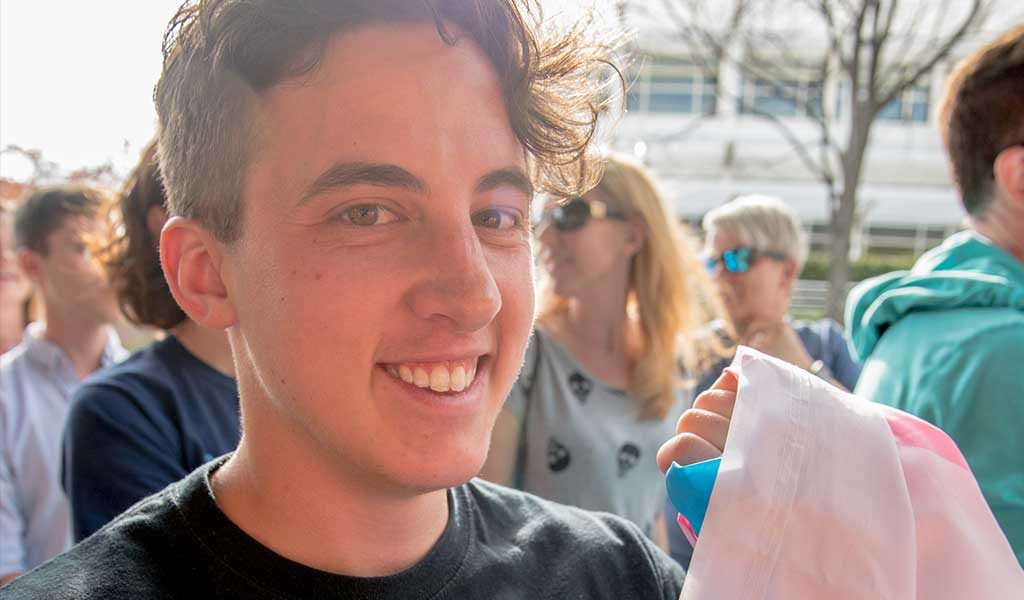
You grew up in rural North Carolina. Can you share a little about what that experience was like and how you felt your community responded to diverse identities (yours and others)?
Growing up in rural North Carolina had pros and cons like most places. I had a very idyllic childhood. I grew up in the country with acres of woods in my backyard. Some of my fondest memories growing up are playing in those woods. However, living in a rural area, I didn’t have access to much in the way of diversity. My town was very homogenous, so anybody who was different tended to stand out.
I already moved away by the time I came out as trans, but the local paper did run a news story on me as part of a series about people in the community who were made to feel invisible. I knew that there would be people in the community who would respond negatively to the news story, but I was actually surprised at the number of positive responses the story received. It was an eye-opening experience.
Have you ever been bullied or felt like you were in a hostile space directed at you? If so, could you share what happened?
During my first year of high school, I was the target of two female bullies who were also first-year students. It was my first year at a K-12 school, and had a hard time making friends because I was very shy and withdrawn. These two girls saw an opportunity and decided to take advantage of it. They never physically harmed me, but they verbally abused me in the hallway, left drunken voicemails on my phone during the weekends, and generally made me feel as if I had no safe space in my life.
What do you find the most effective way to approach a bullying situation?
Firm and direct confrontation with the bully can be effective. Most bullies don’t expect their victims to respond with any measure of confidence. So, when they do, it can throw them off their game. If you feel comfortable, find a public space to do this. Look them in the eye, and use “I feel…” statements. Involving your support network is also effective. Letting a bully know that you are, in fact, not alone, even if it is a teacher, or a parent.
Do you think bullies can change? If so, how?
In my experience, one of the girls who bullied me came to me the following year and apologized for the things she had done. Although we were never friends and I was never able to really trust her, I believe the change she expressed was genuine.
What facet of trans-identity do you believe would help people better understand how to increase inclusiveness and how that inclusion enriches their community?
I think remembering that trans people are, first and foremost, people, is the first step in helping society understand how trans people want to be included. When it comes to bathrooms, for example, we are not asking for special treatment—just the same rights that everyone has.
As a transman of faith, how did your faith community respond to your transition? What do you think other faith organizations can learn to do (or not to do) from your experience?
I came out during my first year as a seminary student, and my community at school was incredibly welcoming and affirming. It was a wonderful place to discover who I was and to begin my journey of becoming. Other faith communities, including former ones from my hometown, had mixed responses. I have had people tell me I am going to hell or that I am turning my back on God’s plan for my life by transitioning.
I always tell faith communities that they can do three things to be more affirming of trans people:
- Be specific in your welcome. That is, let particularly oppressed groups know that they are welcome in your church
- Make the space welcoming. Make sure bathrooms are accessible to people of any gender identity
- Talk about it. Use trans people as positive examples in your sermons, hold educational forums, have resources on hand, etc.
What do you think people should be doing to create safe space?
I think we should be having dialogue about issues that we think are taboo or that make us uncomfortable, because that is where we are going to find that we are more alike than we think, and that at the core, most of us want the same thing.
If you could say one thing to anyone who is the victim of bullying, what would it be?
You are not wrong. You are not sick. You are not broken. You are not alone.
Adam Plant is a queer trans man of faith and a recent graduate of Wake Forest University School of Divinity, Adam hopes to pursue a vocation that allows him to do advocacy work at the intersection of gender identity, sexual orientation, and faith/spirituality. In his free time Adam enjoys acting and producing with local theatre companies and going on adventures with his dog, Obiwan Kenobi. Follow him on Twitter: @LiminalAdam
Photo of Adam Plant courtest of Jenny L. Viars, Dancing Lemur Photography
